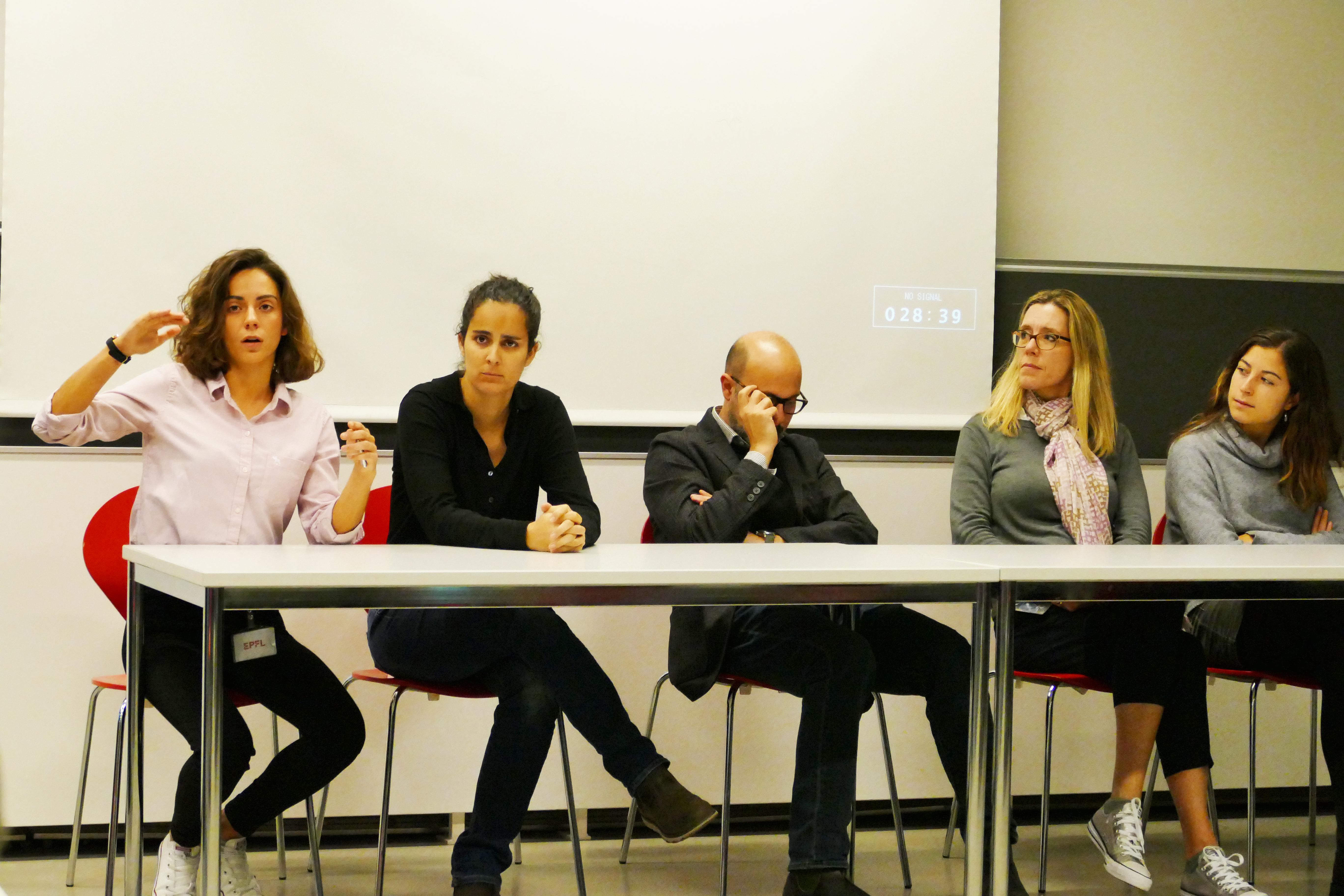CROSS researchers present their projects on “Resistance”

Caroline Roberts, Daniel Gatica-Perez, and Jessica Herzing © 2019 EPFL
On November 7, researchers from EPFL and the University of Lausanne (UNIL) publicly presented four projects from the 2019 edition of the Collaborative Research on Science and Society (CROSS) Program in the College of Humanities. All projects addressed, from an interdisciplinary perspective, the theme of “resistance”.
The CROSS program supports projects on current issues in society and technology that are collaborations between EPFL researchers in the natural and life sciences or engineering, and UNIL researchers in the social sciences or humanities. Through its annual call, CROSS provides competitive seed-funding grants of up to CHF60,000 per project.
Last year, CROSS awarded four grants to interdisciplinary EPFL-UNIL projects that “examine the notion of resistance in scientifically original and promising ways”. The concept of “resistance” may seem at first like an unusually broad research focus, but CROSS Program Manager Gabriela Tejada explains that the theme is intentionally open, to allow researchers from different domains to address the same challenge from different perspectives.
“It is very broad, but at the same time, it is timely and relevant,” Tejada says. “I see a lot of innovation with regard to this year’s projects. They are bringing new ideas for tackling societal and technological challenges, which is really what we’re looking for with CROSS.”
We value your feedback
Caroline Roberts and Jessica Herzing of UNIL’s Faculty of Social and Political Sciences (UNIL SSP) and Daniel Gatica-Perez of the EPFL lab of the Idiap Research Institute (LIDIAP) addressed a common problem in social science research: low survey response rates. Their project, “Leveraging on-device smartphone inference to address resistance to participate in social surveys”, explored ways to make smartphone survey completion attractive to respondents. For the first phase, the researchers used the data collection platform Civique to determine what drives resistance to smartphone survey-taking. They identified concerns about data privacy and pop-up notifications, as well as technological barriers. The team plans to conduct further tests using other platforms to dig deeper into the complex challenges of using technology to do social science research.
Considering other points of view
Andreas Spitz of the Data Science Lab (DLab) in EPFL’s School of Computer and Communication Sciences presented a project that also included DLab head Robert West, and Ahmad Abu-Akel of UNIL SSP: “Mellowing extreme views via celebrity spokespeople – but gently”. The investigators presented web users with improvised quotes from respected celebrities in a randomized, controlled study. The quotes ranged from pro to con on four “hot button” issues: climate change, abortion, vaccination and immigration. The initial findings were consistent with the theme of resistance, as many participants exhibited a reinforcement of their own opinions across categories. Ultimately, the researchers hope to design algorithms for determining the best spokesperson for “mellowing” extreme views.
Is your job robot-proof?
Rafael Lalive of UNIL’s Faculty of Business and Economics (HEC) presented the project, “Resisting human obsolescence in a world disrupted by machines”, with HEC colleagues Inés Guardans Gonzalez and Isabelle Chappuis, as well as Nicola Nosengo of STI’s Lab for Intelligent Systems (LIS). To understand which types of jobs would be most resistant to automation by robots, the researchers developed a rubric for comparing data on human and machine capabilities (e.g., inductive reasoning versus observation learning). They assigned a technology-readiness level to the robotic capabilities, and used that to compute the automatable share of skills required by different jobs. In the future, the researchers hope to create an online “human resilience calculator”, to identify skills that humans can develop to maintain a resilient workforce capable of surviving – or even benefiting from – increasing automation.
Resisting trauma
This research, led by Denis Gillet of EPFL’s School of Engineering (STI) and Delphine Preissmann of UNIL-SSP, was presented by Maria Gaci (STI) and Caroline Bendahan (UNIL-SSP). The project, “ReMediation: lmproving resistance to trauma through digital mediation”, focused on technological approaches to detecting, preventing, and treating trauma using digital tools. The researchers designed an experiment within the “trauma film paradigm”, in which subjects watch video footage designed to evoke an emotional response, and combined it with the collection of physiological (heart rate and skin conductivity) data, as well as psychological intervention. Going forward, the team will implement their experimental framework using a web app running on a tablet browser.
Read more about the CROSS program on Resistance, as well as past and future programs.







